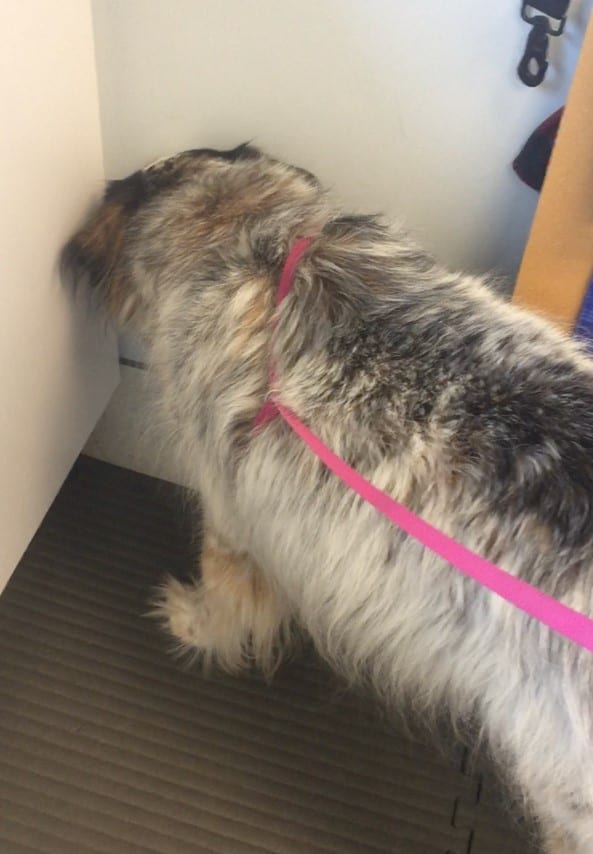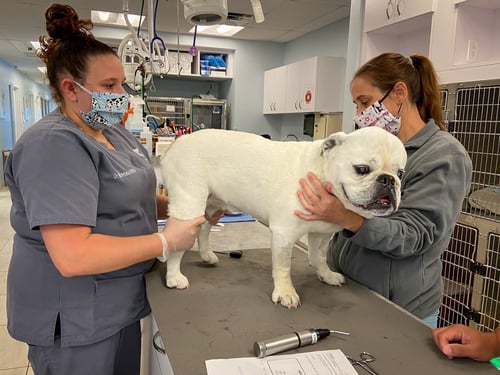7 Reasons Why Your Dog is Pressing Its Head Against the Wall
Maybe you have an affectionate pup that shows you love by pressing its head against yours while you smother it with smooches, and that’s cute as heck. But if your dog is pressing its head against the wall, it’s showing you something is wrong.

What is Dog Head Pressing?
Dog head pressing is the obsessive act of pressing the head against a wall, corner, floor, or other firm, stationary object. The why is somewhat of a controversy. It could be related to a feeling of discomfort or pain, or it could be related to altered awareness, causing a dog to walk into the wall and not be able to navigate away from it.
Unfortunately, what we do know is that head pressing in dogs almost always indicates serious illness. It is generally a sign of forebrain dysfunction, and some other common signs are:
- Changes in behavior
- Walking in circles
- Seizures
- Ataxia (incoordination)
- Blindness
Potential Causes of Dog Head Pressing
These are seven possible causes of forebrain dysfunction and head pressing in dogs:
BRAIN TUMORS
Out of all the neurological problems that affect dogs, especially older dogs, brain tumors are one of the most common. However, why these tumors occur is not easy to answer, as a combination of genetic and environmental factors contributes to cancer development.
STROKES
A stroke occurs when blood flow to part of the brain is obstructed (ischemic) or when a blood vessel bursts (hemorrhagic), causing damage to nerve cells and their pathways. Strokes cause a very sudden and severe onset of symptoms.
INFLAMMATION OF THE BRAIN
In dogs, inflammation within the brain is more often autoimmune and is considered another potential cause of dog head pressing. Inflammation can occur in the membranes surrounding the brain (meningitis), the brain itself (encephalitis), or a combination of the membranes and the brain (meningoencephalitis).
Another likely symptom of brain inflammation in dogs is pain.
HYDROCEPHALUS
Hydrocephalus is brain swelling caused by cerebrospinal fluid (CSF) buildup inside the skull, due to either reduced absorption or overproduction (less common). It can be acquired or congenital (present at birth), and certain breeds are predisposed, especially toy breeds.
Other possible symptoms of Hydrocephalus in dogs are:
- Domed skull, soft spot on head (persistent fontanelle), wide set eyes
- Slow growth, small stature
- Difficulty learning, house training, eating, drinking

TRAUMATIC BRAIN INJURY
Any trauma to the brain can potentially cause head pressing in dogs, but often cause much more severe symptoms first.
More signs of a traumatic brain injury in dogs might be:
- Loss of consciousness
- Eye, ear, or nose bleed
- Heavy or rapid breathing
- Abnormally slow heart rate
- Difficulty regulating body temperature
- Abnormal posture
- Changes to pupil size and response to light
NERVOUS SYSTEM INFECTIONS
Bacterial, fungal, and viral infections can affect the nervous system. These infections can be contracted through parasites, insect and animal bites, contact with other animals, and exposure in the environment.
Further symptoms of nervous system infections in dogs may include:
- Fever
- Lethargy
- Nasal discharge
- Gastrointestinal symptoms such as diarrhea and vomiting
- Respiratory symptoms such as sneezing and coughing

METABOLIC DISORDER
Conditions like sodium imbalance and severe liver or kidney disease can create toxin buildup in the body, which can cause brain cells to malfunction.
Some other signs of metabolic disease in dogs might be:
- Vomiting and diarrhea
- Loss of appetite and weight
- Increased thirst and need to urinate
- Blood in urine or stool
- Yellowish eyes, tongue, or gums
What You Should Do if Your Dog Is Head Pressing
Head pressing can only be addressed by treating the underlying cause. If you see your dog head pressing, do not delay seeking professional evaluation. If possible, you should see a veterinarian the same day.
Your vet will conduct a complete physical exam, including examination of the eyes, and some baseline testing, including blood work and x-rays. If after evaluating your dog, your veterinarian suspects a brain problem that isn’t explained with the initial testing, you should be referred to a veterinary neurologist for imaging of the brain.
MRI (magnetic resonance imaging) is the best way to achieve a definitive diagnosis, understand the severity of the condition, weigh treatment options, and gauge prognosis.
Contact Southeast Veterinary Neurology if Your Dog Is Head Pressing
While prognosis depends on the underlying cause and its severity, there are medical and surgical treatment options for all of the conditions that lead to dog head pressing. As with most illnesses, the sooner treatment is sought, the better the outcome for the pet patient and its family.
Southeast Veterinary Neurology has three convenient locations in South Florida (Miami, Boynton Beach and Jupiter) and a location in Virginia Beach, VA, each complete with highly skilled veterinary neurologists and state-of-the-art MRI suites. Open 24 hours a day, seven days a week, 365 days a year, we are here to support your family through the challenges (and triumphs!) of canine neurological disease.